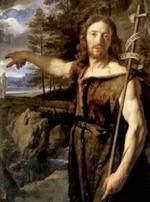Fathers of the Church
Epistle VI: to King Childebert
by Gregory the Great in 590-604 | translated by James Barmby, D.d
Gregory to Childebert, King of the Franks.
As much as royal dignity is above that of other men, so much in truth does the high position of your kingdom excel that of the kingdoms of other nations. And yet to be a king is not extraordinary, there being others also; but to be a Catholic, which others are not counted worthy to be, this is enough. For as the splendour of a great lamp shines by the clearness of its light in the darkness of earth's night, so the clear light of your faith glitters and flashes amid the dark perfidy of other nations. Whatever the other kings glory in having you have. But they are in this regard exceedingly surpassed, because they have not the chief good thing which you have. In order, then, that they may be overcome in action as well as in faith, let your Excellence always shew yourself kind to your subjects. And, if there are any things such as to offend your mind, punish them not without enquiry. For then you will the more please the King of kings, that is the Almighty Lord, if, restraining your power, you feel that you may not do all that you can.
Now that you keep purity of faith both in mind and deed, the love that is in you of the blessed Peter, Prince of the apostles, evidently shews, whose property has been so far well governed and preserved under the sway of your supremacy. But since Dynamius the Patrician, who on our recommendation looked after this property, is not able, as we have learnt, to govern it now, lest the little patrimony which is in your parts should be ruined from neglect, we have therefore sent the bearer of these presents, our most beloved son the presbyter Candidus to govern it, whom we commend in all respects to your Excellency, greeting you in the first place with paternal charity, with the request that, if by any chance any wrong has been done there, or if the property of the same little patrimony is detained by any one, the matter may be set right, and what has been alienated may be restored to its original ownership; that so your equity, as well as your faith, may shine forth to all nations, which will be something very glorious and laudable.
Moreover we have sent to your Excellency Saint Peter's keys, containing a portion of his chains, to protect you from all evils, when hung on your neck.
Taken from "The Early Church Fathers and Other Works" originally published by Wm. B. Eerdmans Pub. Co. in English in Edinburgh, Scotland, beginning in 1867. (LNPF II/XII, Schaff and Wace). The digital version is by The Electronic Bible Society, P.O. Box 701356, Dallas, TX 75370, 214-407-WORD.






